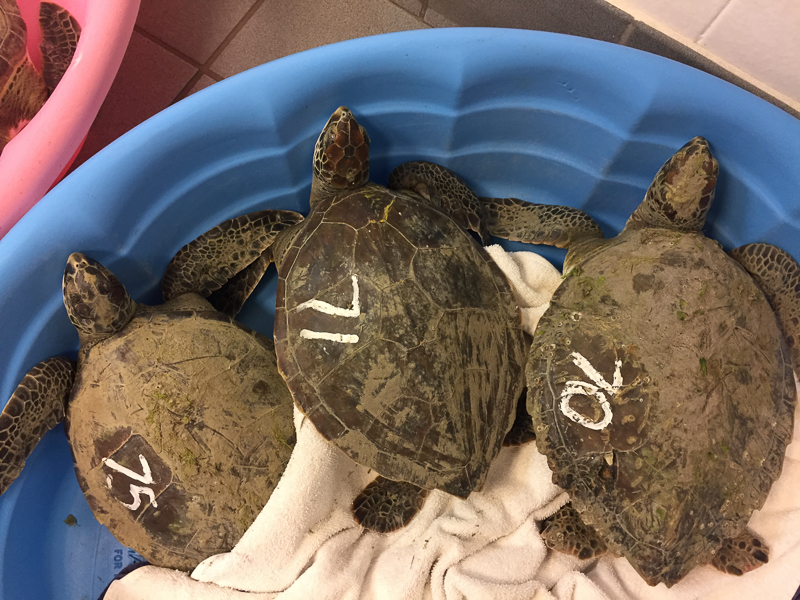N.C. Museum, Aquarium Partner to Treat Cold-Stunned Sea Turtles
For immediate release ‐ January 30, 2020
Contact: Jon Pishney, 919.707.8083. Images available upon request
Download a high-resolution version of this image.
Video of museum staff treating cold-stunned sea turtles: https://youtu.be/UVwGhTS5c9o. Please credit: Courtesy of N.C. Dept. of Natural and Cultural Resources.
Raleigh, N.C. – Recent weather and cold temperatures have contributed to a large number of cold-stunned sea turtles needing rescue and treatment in North Carolina. Many of the turtles were transported to the Roanoke Island Aquarium’s Sea Turtle Assistance and Rehabilitation (STAR) Center, which found itself quickly running out of room for new patients as the number of sea turtles in their care recently increased to 178.
Veterinary staff at the N.C. Museum of Natural Sciences offered to help. This week, eight green sea turtles were transported from the STAR Center to the museum in Raleigh, where they will be monitored and cared for over the next few months by Head Veterinarian Dr. Dan Dombrowski and the museum’s Living Collections staff.
“We’re happy to have this opportunity to assist the aquarium with this conservation action effort,” said Dombrowski. “Sea turtles are such an important species to help rehabilitate. They are able to live so long, if we can help these juvenile turtles today, they may be around for another 100 years and produce thousands of offspring for the future.”
Cold-stunning is a condition which is similar to hypothermia and is caused by dropping water temperatures. The condition renders the turtles unable to swim properly. The recovery process begins by gradually warming the turtles back up over the course of a few days.
The turtles will occasionally be on view to visitors while receiving veterinary care at the museum’s “Window on Animal Health.” Follow the museum on Twitter @naturalsciences for more information.
Once the turtles are deemed healthy enough to release, they will be taken offshore and released into warmer waters.
The N.C. Museum of Natural Sciences is just one of many institutions across the state assisting in this crucial effort to aid cold-stunned sea turtles. The effort to rescue and rehabilitate sea turtles is led by the N.C. Wildlife Resources Commission, which has collaborated with many federal, state and private organizations in the effort, including the North Carolina Aquariums and Jennette’s Pier, Center for Marine Sciences and Technology, North Carolina State University College of Veterinary Medicine, Cape Lookout National Seashore, Karen Beasley Sea Turtle Rescue and Rehabilitation Center, Cape Hatteras National Seashore, Hatteras Island Wildlife Rehabilitation, U.S. Fish and Wildlife Service, National Oceanic and Atmospheric Administration, and National Marine Fisheries Service.
About the North Carolina Department of Natural and Cultural Resources
The N.C. Department of Natural and Cultural Resources (NCDNCR) is the state agency with a vision to be the leader in using the state’s natural and cultural resources to build the social, cultural, educational and economic future of North Carolina. NCDNCR’s mission is to improve the quality of life in our state by creating opportunities to experience excellence in the arts, history, libraries and nature in North Carolina by stimulating learning, inspiring creativity, preserving the state’s history, conserving the state’s natural heritage, encouraging recreation and cultural tourism, and promoting economic development.
NCDNCR includes 27 historic sites, seven history museums, two art museums, two science museums, three aquariums and Jennette’s Pier, 39 state parks and recreation areas, the N.C. Zoo, the nation’s first state-supported Symphony Orchestra, the State Library, the State Archives, the N.C. Arts Council, State Preservation Office and the Office of State Archaeology, along with the Division of Land and Water Stewardship. For more information, please visit www.ncdcr.gov.


